
 March 26, 2015 - When mortgage bankers cold cocked the world economy, and eliminated disposable income from the average family budget, overnight, millions of people could no longer afford their own homes; much less buy a new one. With the housing market at a standstill, developers with time on their hands turned their gaze to Tallahassee, where they are deified by lobbyists and worshipped as campaign cash cows by lawmakers.
March 26, 2015 - When mortgage bankers cold cocked the world economy, and eliminated disposable income from the average family budget, overnight, millions of people could no longer afford their own homes; much less buy a new one. With the housing market at a standstill, developers with time on their hands turned their gaze to Tallahassee, where they are deified by lobbyists and worshipped as campaign cash cows by lawmakers.
Fed up with court-ordered penalties for delivering substandard construction, in 2009, developer trade associations embarked on a multi-year strategy to block defrauded homeowners from plundering future profits. Since the courts refused to back off when developers were caught violating State law, they would buy some play for pay politicians to circumvent the offending statutes.

Implied Warranties

 |
| DEFECTIVE ROAD |
Since home buyers who purchase their dream homes in a new community have neither the access nor acumen to meaningfully inspect roads, catch basins, culverts, drainage facilities, street lighting or underground utilities that critically impact a home�s habitability, they are forced to rely on developer representations that these complex common appurtenances are fully functional, code compliant and free of defects.
 If they later discover that roadways, retention ponds, power lines, and sewer systems throughout a subdivision are plagued by defective construction, they were traditionally protected by an implied warranty. These implied warranties provided homeowners with legal grounds for requiring the developer to bring the defective common elements up to code and re-engineer or repair substandard offsite appurtenances marketed as fully operational.
If they later discover that roadways, retention ponds, power lines, and sewer systems throughout a subdivision are plagued by defective construction, they were traditionally protected by an implied warranty. These implied warranties provided homeowners with legal grounds for requiring the developer to bring the defective common elements up to code and re-engineer or repair substandard offsite appurtenances marketed as fully operational.
 During the 2012 legislative session, construction industry trade associations launched a plan to prohibit common law implied warranties of fitness, merchantability and habitability from applying to residential construction. While lobbyists could draft the legislation, they would still need to recruit �motivated� lawmakers to file bills in both houses.
During the 2012 legislative session, construction industry trade associations launched a plan to prohibit common law implied warranties of fitness, merchantability and habitability from applying to residential construction. While lobbyists could draft the legislation, they would still need to recruit �motivated� lawmakers to file bills in both houses.
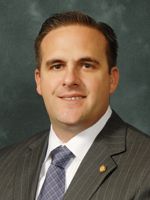 |
| REP. FRANK ARTILES |
 |
| SENATOR MICHAEL BENNETT |
After researching potential candidates, the Florida Home Builders Association (FHBA) and the National Association of Home Builders (NAHB) hand-picked former Bradenton Senator Michael Bennett - an electrical contractor looking for a new employer since term limits would snuff his career as a lawmaker later in 2012 � and Statehouse Representative Frank Artiles � a Miami general contractor.
To shield their benefactors in the building trades from liability, the two lawmakers had to redefine construction defects as a blameless side effect of life in the Sunshine State. Armed with the lobbyist�s language, Bennett filed SB 1196 in the Senate and Artiles filed companion bill HB 1013 in the Statehouse. Incredibly, they marketed the bills as a consumer friendly effort to spur new development.
 |
| DONNA BERGER |
 |
| YELINE GOIN |
With the help of key lawmakers who also benefitted from the building lobby�s largesse, including some vetting committee chairs, the bills were carefully escorted to fruition. While testifying against these anti-consumer bills, activist association attorneys Donna DiMaggio Berger and Yeline Goin watched lobbyists short-circuit the legislative process to circumvent perceived obstacles.
For instance, when Artiles� HB 1013 was scheduled for a February 2nd hearing in the House Business and Consumer Affairs Subcommittee chaired by Representative Doug Holder � where anti-consumer bills buy a boatload of bad press, Berger reported how lobbyists got the bill pulled and re-referenced to the Judiciary Committee, its final pit stop in the Statehouse and the parent body of the Civil Justice Committee, where the bill had already been approved three days earlier. Governor Rick Scott cheerfully signed the bill into law on April 27, 2012 and it became effective on July 1, 2012.

 What did this mean to association homeowners? The law victimizes anyone who must rely on developer representations when buying a home, whether in a homeowner association, condominium, co-op, timeshare or a mobile home park. Since association members are assessable for repairing or correcting defective common elements, this law shifts liability for a developer�s negligence to associations and their members. It infers that condo and co-op owners who discover that their new building�s drainage system fills the kitchen sink with sewage have only themselves to blame � and should have somehow run a diagnostic on the interred utilities before buying their units.
What did this mean to association homeowners? The law victimizes anyone who must rely on developer representations when buying a home, whether in a homeowner association, condominium, co-op, timeshare or a mobile home park. Since association members are assessable for repairing or correcting defective common elements, this law shifts liability for a developer�s negligence to associations and their members. It infers that condo and co-op owners who discover that their new building�s drainage system fills the kitchen sink with sewage have only themselves to blame � and should have somehow run a diagnostic on the interred utilities before buying their units.
 Stripped of implied warranty protection, the only remaining legal recourse for buyers in new communities, condominiums or cooperatives is a private cause of action for breach of the building code under section 553.84, Florida Statutes. For selling a non-functional neighborhood drainage system, a spontaneously collapsing road bed, or a condo roof insulated with flypaper, the developer might pay a modest fine. It�s less than clear how this will benefit consumers, as claimed by its sponsors.
Stripped of implied warranty protection, the only remaining legal recourse for buyers in new communities, condominiums or cooperatives is a private cause of action for breach of the building code under section 553.84, Florida Statutes. For selling a non-functional neighborhood drainage system, a spontaneously collapsing road bed, or a condo roof insulated with flypaper, the developer might pay a modest fine. It�s less than clear how this will benefit consumers, as claimed by its sponsors.

Deifying Design Professionals

 |
| PALM CITY SENATOR JOE NEGRON |
The crusade to subvert statutory protections against defective construction continued in 2013, when the Design trades marshalled their legislative resources to inoculate design professionals against liability for defective work product. Reviving legislation vetoed by the Governor in 2010 and killed in committee in 2011, Palm City Senator Joe Negron filed Senate Bill 286 - entitled �Design Professionals�.
 Enacting SB 286 would enable architects, interior designers, landscape architects, engineers, & surveyors (later amended to include geologists) to dispense with liability simply by using specific language that states as much in a contract (in an uppercase font sized at least 5 points larger than the rest of the text). The bill didn�t even carry the pretense that a design professional would still have a statutory incentive to avoid committing malpractice; since it would block victims from filing against a violator�s malpractice insurance.
Enacting SB 286 would enable architects, interior designers, landscape architects, engineers, & surveyors (later amended to include geologists) to dispense with liability simply by using specific language that states as much in a contract (in an uppercase font sized at least 5 points larger than the rest of the text). The bill didn�t even carry the pretense that a design professional would still have a statutory incentive to avoid committing malpractice; since it would block victims from filing against a violator�s malpractice insurance.
Prior to Negron�s bill, although companies could limit their liability in a contract under Florida Law, licensed professionals could not contractually mitigate their �duty of care� to an injured party. While contractual agreements limited liability for law firms, engineering firms, hospitals and accounting firms through which they do business, individual lawyers, engineers, doctors and accountants remained personally liable for malpractice or negligence.
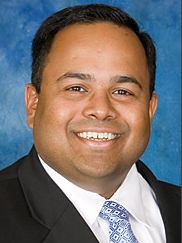 |
CONSTRUCTION LAW
ATTORNEY SANJAY KURIAN |
Skull-blocked by a bill that would openly invite malpractice, Construction Law Specialist Sanjay Kurian of Becker Poliakoff said �No other class of professional has ever been so completely financially insulated from damages caused by their negligence, wrongful acts, or misconduct. As doctors, lawyers, and accountants are precluded by statute from limiting exposure for their own negligence.�
 |
| NAPLES REPRESENTATIVE KATHLEEN PASSIDOMO |
This being his third bite at the apple, Negron knew that a sister bill in the Statehouse would be scrutinized in the Civil Justice Subcommittee, the Business & Professional Regulation Subcommittee and the Judiciary Committee. Scouting a dance partner who brought the required �influence� to the table, he recruited Naples Representative Kathleen Passidomo to file House Bill 575 � the companion legislation in the Statehouse. Not surprisingly, Passidomo sat on the House Civil Justice Subcommittee and served as Vice Chair of the House Judiciary Committee.
 To help Negron avoid the pitfalls that doomed the bills� earlier incarnations, his backers opened the Design Trades cookie jar. As an emollient to the vetting process, Negron and Passidomo brokered �cooperation� between key members of each review committee and Design Trades lobbyists, who �assist� sympathetic politicians with campaign support.
To help Negron avoid the pitfalls that doomed the bills� earlier incarnations, his backers opened the Design Trades cookie jar. As an emollient to the vetting process, Negron and Passidomo brokered �cooperation� between key members of each review committee and Design Trades lobbyists, who �assist� sympathetic politicians with campaign support.
With the wheels greased, after whizzing through both houses, the legislation was signed by Governor Rick Scott on April 24, 2013 and became effective on July 1, 2013. Since malpractice no longer serves as a deterrent to an engineer�s negligence, associations are admonished to contractually leverage their firms, despite the fact that they are often empty shells bereft of assets. Building on this anti-consumer momentum, the campaign to strip homeowners of protection against construction defects continues in the current legislative session � although this newly filed exploding pi�ata specifically targets associations.

Statute of Repose � Targets Condos and Co-ops


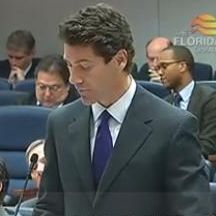 |
| REPRESENTATIVE JAY FANT |
On January 22, 2015, Statehouse Representative Jay Fant (R � Jacksonville), whose family-owned bank failed in 2012, filed House Bill 501 entitled �Limitation of Actions�. A bill summary on the Statehouse website claims it �Reduces period during which action must be brought for latent defect in design, planning, or construction of improvement to real property; provides applicability� A month later, Senator Kelli Stargel (R � Lakeland) filed Senate Bill 1158 on February 23, a companion bill in the other chamber.
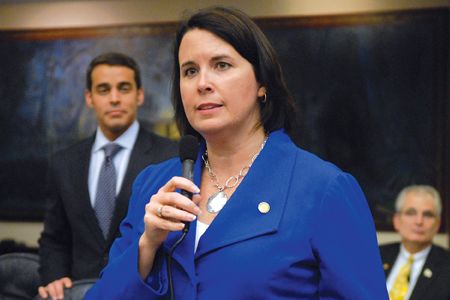 |
| LAKELAND SENATOR KELLI STARGEL |
As currently provided in Section 95.11(3)(c), Florida Statutes, construction-related claims are subject to a statute of limitations of 4 years, as well as a statute of repose period of 10 years. The 4-year time period of the statute of limitations and the 10-year span after which the statute of repose expires begins to run from the latest date of the following events:
Actual possession of the improvement by the owner;
Issuance of a Certificate of Occupancy;
Abandonment of the construction, if not completed; or
Termination of the contract between the professional engineer, registered architect, or licensed contractor and his or her employer.
 An exception to the statute of limitations is provided for hidden or concealed defects which are not discoverable by reasonable and customary inspection, and oblivious to the owner. Under those circumstances, the 4-year statute of limitations does not begin to run until the latent defect is discovered or would have been discovered with due diligence.
An exception to the statute of limitations is provided for hidden or concealed defects which are not discoverable by reasonable and customary inspection, and oblivious to the owner. Under those circumstances, the 4-year statute of limitations does not begin to run until the latent defect is discovered or would have been discovered with due diligence.
The statute of repose differs significantly from the statute of limitations. While the statute of limitations limits the time within which an action may be brought, based upon the accrual of a cause of action, the statute of repose sets a final deadline for an owner to seek any manner of legal redress for faulty construction, whether for new construction or renovations. It imposes an absolute bar on claims after the repose period expires, regardless of the circumstances. As remarked in a February 25th House Staff Analysis, �Courts construe a cause of action rescinded by a statute of repose as if the right to sue never existed.�
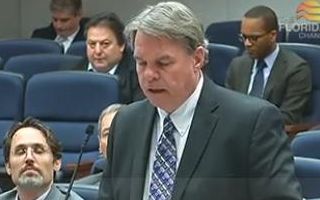 |
| RON WOODS P.E. - BILL IS UNFAIR TO CONSUMERS |
The repose period in Florida was 15 years until reduced to 10 years in 2006, and if Fant�s gift to developers is successful, the time within which construction-related claims may be brought will be further reduced to 7 years. While Fant soft-peddled his bill to lawmakers in the House Civil Justice Subcommittee, suggesting that most defects become apparent within a few years of construction, Engineers Ronald Woods, P.E. of Woods Engineering and Tom Miller, P.E. of Structural Engineering and Inspections, Inc. disagreed, affirming how those defects that are most costly to mitigate are often discovered 8 to 10 years after a construction project. Associations regularly encounter such defects years after a concrete restoration, roof replacement, elevator modernization and/or other budget-busting improvement projects.
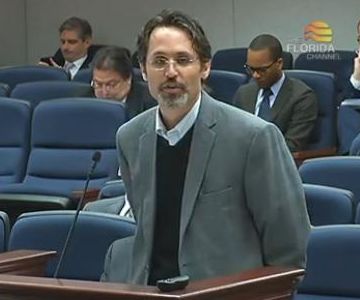 |
| TOM MILLER P.E. - NO NEED FOR BILL |
In his testimony, Former Senator Fred Dudley disputed Fant�s contention that his bill had no taxpayer impact. Dudley decried how a truncated statute of repose would force taxpayers to underwrite developer defects in hospitals, government buildings, bridges and schools. While HB 501 reduces the window of opportunity for businesses, local governments, homeowners or any property owner to enforce remedies against developers for latent construction defects, association advocates disclosed an impact that wasn�t readily apparent, and far more insidious.
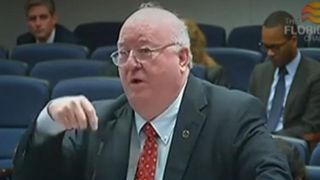 |
FORMER SEN FRED DUDLEY - WILL COST TAXPAYERS $BILLIONS
FOR DEFECTS IN SCHOOLS, COURTHOUSES, HOSPITALS, ETC |
By exploiting the statutory time constraints that currently govern developer �turnover� (the process that shifts control of an association from the developer to the unit owners), Fant�s bill wouldn�t simply diminish the window available to associations for prosecuting substandard construction claims, but slam that window shut � and force condo and co-op homeowners to pay for all developer construction defects, latent or blatant. The House Staff Analysts explained how Fant�s association mouse trap would work.
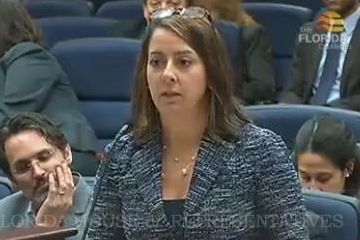 |
| CALL ADVOCATE YELINE GOIN - BILL CHEATS CONDOS |
A developer must first turn over control of an association to the unit owners before a condominium or cooperative association can sue the developer to correct common element construction defects or enforce statutory warranties contractually due to unit owners from the developer.
However, Section 719.301(1)(e), Florida Statutes, empowers a developer to delay turning over control of a cooperative until 7 years after creation of the cooperative association. Section 718.301(1)(g), Florida Statutes, provides that a developer may retain control of a condominium until 7 years after recording a �certificate of a surveyor and mapper� or certain instruments that transfer title to condominium unit owners.
 Citing how Fant�s bill would protect culpable developers by trampling the rights of association homeowners, the House Staff Analysis states, �By shortening the statute of repose to 7 years, if a developer retains control over an association up to the statutory maximum of 7 years before turnover to the unit owners, potential claims and/or causes of action which the unit owners might otherwise have been ready, willing, and able to pursue may be barred � and those liable on such claims may avoid legal action.� Game over.
Citing how Fant�s bill would protect culpable developers by trampling the rights of association homeowners, the House Staff Analysis states, �By shortening the statute of repose to 7 years, if a developer retains control over an association up to the statutory maximum of 7 years before turnover to the unit owners, potential claims and/or causes of action which the unit owners might otherwise have been ready, willing, and able to pursue may be barred � and those liable on such claims may avoid legal action.� Game over.
In allowing developers to wait until a 7-year statute of repose expires before turning over control of an association, by the time that unit owners finally have a right to sue the developer � even for clearly observable construction defects � they are legally barred from doing so after the repose period runs out. If a developer confessed on CNN to using scotch tape instead of nails, no claims could be brought. By reducing the repose period to seven years, Fant�s bill will allow developers to dodge responsibility for defective construction, and saddle unit owners with the cost of repairs.
 |
| SUBCOMMITTEE CHAIR KATHLEEN PASSIDOMO |
If enacted, HB 501 has an effective date of July 1, 2015. The 7-year statute of repose will apply to all actions commenced on or after that date, regardless of when the cause of action accrued. When members of the Civil Justice Subcommittee grew nervous about approving a wholesale evisceration of association remedies to developer defects, on February 16, Fant offered a Committee Substitute containing an amendment that marginally softened its initial impact.
 Specifically, any action that would not have been barred by the existing statute of repose but will be barred by Fant�s newly-enacted statute will not be immediately disallowed. Instead, such actions may be commenced before the first anniversary of the amendment, on July 1, 2016, after which any actions not yet filed will be forever barred. Since Committee Chair Kathleen Passidomo (R � Naples) banked contributions of more than $83,000 last year from Finance, Construction and Realty interests, her support, and Fant�s one-year concession bought the single vote he needed to insure committee approval by a vote of 7 Yeas vs. 6 Nays on February 17th.
Specifically, any action that would not have been barred by the existing statute of repose but will be barred by Fant�s newly-enacted statute will not be immediately disallowed. Instead, such actions may be commenced before the first anniversary of the amendment, on July 1, 2016, after which any actions not yet filed will be forever barred. Since Committee Chair Kathleen Passidomo (R � Naples) banked contributions of more than $83,000 last year from Finance, Construction and Realty interests, her support, and Fant�s one-year concession bought the single vote he needed to insure committee approval by a vote of 7 Yeas vs. 6 Nays on February 17th.
 |
| DONNA BERGER UPDATES PROPERTY MANAGERS AT SEAWATCH |
At a March 5th legislative update convened at the Seawatch Restaurant in Lauderdale-by-the-sea, Community Association Leadership Lobby (CALL) association advocate Donna Berger told 35 attending condo and co-op property managers that HB 501 was �among the worst of this year�s legislative proposals that affect community associations,� warning �If that passes it will significantly hurt associations. The statute of repose is going to run out and you�re not going to even know what hit you as the homeowner.�
Observing how �They (developers and construction companies) would be off the hook� after the seventh year following a construction project, Berger exclaimed, �You know who is on the hook? The homeowner. The homeowner is going to be specially assessed for all these defects. The bottom line is, this is a horrible bill that we�re hoping will be derailed.� She cautiously added, �But we�re up against the special interests. So it�s going to take a big fight.�
 |
| CALL ADVISORY BOARD |
Berger�s battleground is the bill�s next committee stop � the House Judiciary Committee � where Fant is a rookie member. Unless Berger can quickly marshal CALL�s Advisory Board to encourage sending the vetting committee members a blizzard of acrimonious emails from associations across Florida, the fight will move to the Senate, where Kelli Stargel�s companion bill � SB 1158 � must survive review by the Senate Committees on the Judiciary, Regulated Industries and Rules.
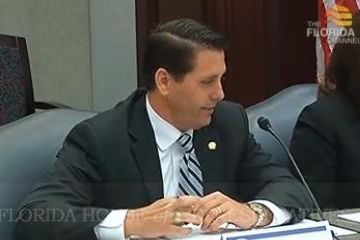 |
| MORAITIS OPPOSES BILL |
Berger also observed that if the bill is enacted, Florida�s 7-year statute of repose would be the shortest in the entire country. Ironically, two lawmakers who were recently recognized by CALL for supporting pro-association legislation faced off in the Civil Justice Subcommittee. District 93 Statehouse Representative George Moraitis led the charge against the bill, remarking �How do you go home and face your constituents after voting for a bill like this,� while Committee Chair Kathleen Passidomo sucker punched her association constituents by lining up support for developers. Although Passidomo cut a deal to approve the bill, she warned Fant that if he didn�t correct the adverse impact his bill has on associations, she would oppose it when reviewed by the Judiciary Committee - where she serves as Vice Chair.
 |
| TRAVIS MOORE |
 In his testimony, Fant claimed that until just before the hearing - he didn't know that his bill would deprive association homeowners of the right to bring legal action for latent defects, and expressed his intention to meet with association advocates to address this "unintended consequence". Along with Yeline Goin from CALL, also attending the hearing was Travis Moore, an association advocate representing the Community Associations Institute (CAI). Since the bill was sent to the Judiciary Committee on February 26th, Goin and Moore have little time to convince Fant that he should make good on his promise, and exempt associations from his 7-year repose period. They will need your help.
In his testimony, Fant claimed that until just before the hearing - he didn't know that his bill would deprive association homeowners of the right to bring legal action for latent defects, and expressed his intention to meet with association advocates to address this "unintended consequence". Along with Yeline Goin from CALL, also attending the hearing was Travis Moore, an association advocate representing the Community Associations Institute (CAI). Since the bill was sent to the Judiciary Committee on February 26th, Goin and Moore have little time to convince Fant that he should make good on his promise, and exempt associations from his 7-year repose period. They will need your help.

Time to Step Up

Although the bill is most damaging to pre-turnover associations, it will affect all construction, and diminish the time available to discover and remedy latent defects in your building. When associations perform concrete restorations, roof replacements, drainage upgrades, deck waterproofing and other costly projects with an estimated useful life of 10 � 15 years and despite proper maintenance, evidence of shoddy construction begins surfacing after 7 or 8 years, HB 501 will protect the culpable contractor while every association homeowner is assessed $tens of thousands toward the $multi-million repair costs.
Most unit owners will suffer a double whammy, as this bill also threatens every Florida taxpayer. The $billions in repair costs for latent defects afflicting schools, bridges, hospitals, highways and other public works projects will be chalked off the contractor's punch list - and slipped neatly into your tax bill.
As CALL, CAI and other association advocates mobilize motivated unit owners from all over Florida to ask vetting committee members to quash this danger to millions of Florida association homeowners, they will likely leave the heavy lifting to a handful of activist communities � such as the Galt Mile � where sleepy retirees react poorly to threats from Tallahassee.
See below for links to the membership websites for each of the bills� House and Senate vetting committees, as well as the telephone numbers, email addresses and websites of their respective Committee leadership. To avoid being unnecessarily assessed for defects that usually surface down the road, bang out a few emails now. If the vetting committees are peppered with emails opposing the bill, it will die on the calendar - get a one-way ticket to the cornfield - and snap the universe back into balance. 2 million Florida unit owners (including all your Galt Mile neighbors) will be in your debt, along with every property owner in the State! Not a bad way to fritter some spare time on a Sunday afternoon.

Contact Info

House Judiciary Committee: Web Page
House Judiciary Committee Chair Charles McBurney (R) - Web Page; Tallahassee Phone: (850) 717-5016, District phone: (904) 359-6090;
Email: [email protected]
House Judiciary Committee Vice Chair Kathleen Passidomo (R) - Web Page; Tallahassee Phone: (850) 717-5106, District phone: (239) 417-6200;
Email: [email protected]
House Judiciary Committee Democtatic Ranking Member Dave Kerner (D) - Web Page; Tallahassee Phone: (850) 717-5087, District phone: (561) 641-3406;
Email: [email protected]
Senate Committee on Judiciary: Web Page
Senate Committee on Judiciary Chair Senator Miguel Diaz de la Portilla (R) - Web Page; Tallahassee Phone: (850) 487-5040, District phone: (305) 643-7200;
Email: [email protected]
Senate Committee on Judiciary Vice Chair Senator Jeremy Ring (D) - Web Page; Tallahassee Phone: (850) 487-5029, District phone: (954) 917-1392;
Email: [email protected]
Senate Committee on Regulated Industries: Web Page
Senate Committee on Regulated Industries Chair Senator Rob Bradley (R) - Web Page; Tallahassee Phone: (850) 487-5007, District phone: (904) 278-2085;
Email: [email protected]
Senate Committee on Regulated Industries Vice Chair Senator Gwen Margolis (D) - Web Page; Tallahassee Phone: (850) 487-5035, District phone: (305) 571-5777;
Email: [email protected]
- Senate Committee on Rules: Web Page
Senate Committee on Rules Chair Senator David Simmons (R) - Web Page; Tallahassee Phone: (850) 487-5010, District phone: (407) 262-7578;
Email: [email protected]
Senate Committee on Rules Vice Chair Senator Darren Soto (D) - Web Page; Tallahassee Phone: (850) 487-5014, District phone: (407) 846-5187;
Email: [email protected]
Two or three should do the trick, depending on how badly you want to eject these BOZOs from your wallet?